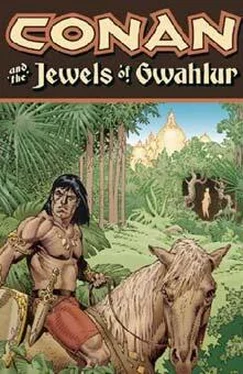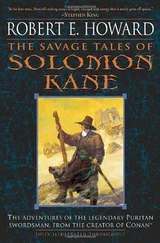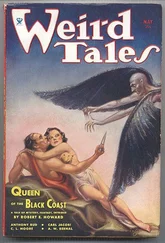Robert Howard - Jewels of Gwahlur
Здесь есть возможность читать онлайн «Robert Howard - Jewels of Gwahlur» весь текст электронной книги совершенно бесплатно (целиком полную версию без сокращений). В некоторых случаях можно слушать аудио, скачать через торрент в формате fb2 и присутствует краткое содержание. Жанр: Героическая фантастика, на английском языке. Описание произведения, (предисловие) а так же отзывы посетителей доступны на портале библиотеки ЛибКат.
- Название:Jewels of Gwahlur
- Автор:
- Жанр:
- Год:неизвестен
- ISBN:нет данных
- Рейтинг книги:5 / 5. Голосов: 1
-
Избранное:Добавить в избранное
- Отзывы:
-
Ваша оценка:
- 100
- 1
- 2
- 3
- 4
- 5
Jewels of Gwahlur: краткое содержание, описание и аннотация
Предлагаем к чтению аннотацию, описание, краткое содержание или предисловие (зависит от того, что написал сам автор книги «Jewels of Gwahlur»). Если вы не нашли необходимую информацию о книге — напишите в комментариях, мы постараемся отыскать её.
Jewels of Gwahlur — читать онлайн бесплатно полную книгу (весь текст) целиком
Ниже представлен текст книги, разбитый по страницам. Система сохранения места последней прочитанной страницы, позволяет с удобством читать онлайн бесплатно книгу «Jewels of Gwahlur», без необходимости каждый раз заново искать на чём Вы остановились. Поставьте закладку, и сможете в любой момент перейти на страницу, на которой закончили чтение.
Интервал:
Закладка:
Robert Howard
Jewels of Gwahlur
1. Paths of Intrigue
The cliffs rose sheer from the jungle, towering ramparts of stone that glinted jade-blue and dull crimson in the rising sun, and curved away and away to east and west above the waving emerald ocean of fronds and leaves. It looked insurmountable, that giant palisade with its sheer curtains of solid rock in which bits of quartz winked dazzlingly in the sunlight. But the man who was working his tedious way upward was already halfway to the top.
He came from a race of hillmen, accustomed to scaling forbidding crags, and he was a man of unusual strength and agility. His only garment was a pair of short red silk breeks, and his sandals were slung to his back, out of his way, as were his sword and dagger.
The man was powerfully built, supple as a panther. His skin was bronzed by the sun, his square-cut black mane confined by a silver band about his temples. His iron muscles, quick eyes and sure feet served him well here, for it was a climb to test these qualities to the utmost. A hundred and fifty feet below him waved the jungle. An equal distance above him the rim of the cliffs was etched against the morning sky.
He labored like one driven by the necessity of haste; yet he was forced to move at a snail's pace, clinging like a fly on a wall. His groping hands and feet found niches and knobs, precarious holds at best, and sometimes he virtually hung by his finger nails. Yet upward he went, clawing, squirming, fighting for every foot. At times he paused to rest his aching muscles, and, shaking the sweat out of his eyes, twisted his head to stare searchingly out over the jungle, combing the green expanse for any trace of human life or motion.
Now the summit was not far above him, and he observed, only a few feet above his head, a break in the sheer stone of the cliff. An instant later he had reached it — a small cavern, just below the edge of the rim. As his head rose above the lip of its floor, he grunted. He clung there, his elbows hooked over the lip. The cave was so tiny that it was little more than a niche cut in the stone, but it held an occupant. A shrivled brown mummy, cross-legged, arms folded on the withered breast upon which the shrunken head was sunk, sat in the little cavern. The limbs were bound in place with rawhide thongs which had become mere rotted wisps. If the form had ever been clothed, the ravages of time had long ago reduced the garments to dust. But thrust between the crossed arms and the shrunken breast there was a roll of parchment, yellowed with age to the color of old ivory.
The climber stretched forth a long arm and wrenched away this cylinder. Without investigation, he thrust it into his girdle and hauled himself up until he was standing in the opening of the niche. A spring upward and he caught the rim of the cliffs and pulled himself up and over almost with the same motion.
There he halted, panting, and stared downward.
It was like looking into the interior of a vast bowl, rimmed by a circular stone wall. The floor of the bowl was covered with trees and denser vegetation, though nowhere did the growth duplicate the jungle denseness of the outer forest. The cliffs marched around it without a break and of uniform height. It was a freak of nature, not to be paralleled, perhaps, in the whole world: a vast natural amphitheater, a circular bit of forested plain, three or four miles in diameter, cut off from the rest of the world, and confined within the ring of those palisaded cliffs.
But the man on the cliffs did not devote his thoughts to marveling at the topographical phenomenon. With tense eagerness he searched the tree-tops below him, and exhaled a gusty sigh when he caught the glint of marble domes amidst the twinkling green. It was no myth, then; below him lay the fabulous and deserted palace of Alkmeenon.
Conan the Cimmerian, late of the Baracha Isles, of the Black Coast, and of many other climes where life ran wild, had come to the kingdom of Keshan following the lure of a fabled treasure that outshone the hoard of the Turanian kings.
Keshan was a barbaric kingdom lying in the eastern hinterlands of Kush where the broad grasslands merge with the forests that roll up from the south. The people were a mixed race, a dusky nobility ruling a population that was largely pure Negro. The rulers — princes and high priests — claimed descent from a white race which, in a mythical age, had ruled a kingdom whose capital city was Alkmeenon. Conflicting legends sought to explain the reason for that race's eventual downfall, and the abandonment of the city by the survivors. Equally nebulous were the tales of the Teeth of Gwahlur, the treasure of Alkmeenon. But these misty legends had been enough to bring Conan to Keshan, over vast distances of plain, riverlaced jungle, and mountains.
He had found Keshan, which in itself was considered mythical by many northern and western nations, and he had heard enough to confirm the rumors of the treasure that men called the Teeth of Gwahlur. But its hiding place he could not learn, and he was confronted with the necessity of explaining his presence in Keshan. Unattached strangers were not welcome there.
But he was not nonplussed. With cool assurance he made his offer to the stately, plumed, suspicious grandees of the barbarically magnificent court. He was a professional fighting man. In search of employment (he said) he had come to Keshan. For a price he would train the armies of Keshan and lead them against Punt, their hereditary enemy, whose recent successes in the field had aroused the fury of Keshan's irascible king.
The proposition was not so audacious as it might seem. Conan's fame had preceded him, even into distant Keshan; his exploits as a chief of the black corsairs, those wolves of the southern coasts, had made his name known, admired and feared throughout the black kingdoms. He did not refuse tests devised by the dusky lords. Skirmishes along the borders were incessant, affording the Cimmerian plenty of opportunities to demonstrate his ability at hand-to-hand fighting. His reckless ferocity impressed the lords of Keshan, already aware of his reputation as a leader of men, and the prospects seemed favorable. All Conan secretly desired was employment to give him legitimate excuse for remaining in Keshan long enough to locate the hiding place of the Teeth of Gwahlur. Then there came an interruption. Thutmekri came to Keshan at the head of an embassy from Zembabwei.
Thutmekri was a Stygian, an adventurer and a rogue whose wits had recommended him to the twin kings of the great hybrid trading kingdom which lay many days' march to the east. He and the Cimmerian knew each other of old, and without love. Thutmekri likewise had a proposition to make to the king of Keshan, and it also concerned the conquest of Punt — which kingdom, incidentally, lying east of Keshan, had recently expelled the Zembabwan traders and burned their fortresses.
His offer outweighed even the prestige of Conan. He pledged himself to invade Punt from the east with a host of black spearmen, Shemitish archers, and mercenary swordsmen, and to aid the king of Keshan to annex the hostile kingdom. The benevolent kings of Zembabwei desired only a monopoly of the trade of Keshan and her tributaries — and, as a pledge of good faith, some of the Teeth of Gwahlur. These would be put to no base usage, Thutmekri hastened to explain to the suspicious chieftains; they would be placed in the temple of Zembabwei beside the squat gold idols of Dagon and Derketo, sacred guests in the holy shrine of the kingdom, to seal the covenant between Keshan and Zembabwei. This statement brought a savage grin to Conan's hard lips.
The Cimmerian made no attempt to match wits and intrigue with Thutmekri and his Shemitish partner, Zargheba. He knew that if Thutmekri won his point, he would insist on the instant banishment of his rival. There was but one thing for Conan to do: find the jewels before the king of Keshan made up his mind, and flee with them. But by this time he was certain that they were not hidden in Keshia, the royal city, which was a swarm of thatched huts crowding about a mud wall that enclosed a palace of stone and mud and bamboo.
Читать дальшеИнтервал:
Закладка:
Похожие книги на «Jewels of Gwahlur»
Представляем Вашему вниманию похожие книги на «Jewels of Gwahlur» списком для выбора. Мы отобрали схожую по названию и смыслу литературу в надежде предоставить читателям больше вариантов отыскать новые, интересные, ещё непрочитанные произведения.
Обсуждение, отзывы о книге «Jewels of Gwahlur» и просто собственные мнения читателей. Оставьте ваши комментарии, напишите, что Вы думаете о произведении, его смысле или главных героях. Укажите что конкретно понравилось, а что нет, и почему Вы так считаете.







